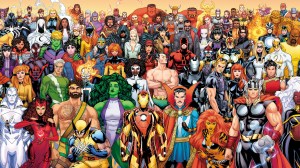The Assassin’s Creed franchise has come quite a long way since the original, and though there have been some missteps along the way, Ubisoft breathed new life into the franchise with Origins and then refined the experience further and crafted one of the best assassins in the franchise in Assassin’s Creed Odyssey. Now comes Assassin’s Creed Valhalla, a game that seeks to forge its own unique identity while bringing back elements from past entries in fresh new ways. That’s a tall and ambitious order, but Valhalla pulls it all off with flair, weaving all of these disparate elements into a delightfully compelling whole.
Videos by ComicBook.com
Valhalla has you stepping into the boots of Eivor, a member of the Raven Clan in Norway who wants to see their once-bustling kingdom flourish once more. Together with your brother Sigurd, you’ll lead your people to a new land in England and seek to forge alliances and carve out a place of your own, and this core mission is tethered to every element and mechanic introduced throughout Valhalla, truly immersing you in the role of Eivor even if the character’s general arc and characterization is a bit of a slow burn.
Granted, it was always going to be an uphill climb after the charismatic fireball that was Kassandra. Comparatively, Eivor is much more of a blank slate early, and it’s not until you’re out of Norway and well into the Ledecestrescire section of the campaign that Eivor really starts to come alive and feel like a person and not just an avatar for the player. This goes for the voice acting as well, as whether male or female the character’s voice and reactions become more human and animated. I didn’t end up loving Eivor as much as Kassandra, but I was still engrossed in her story and enjoyed getting to know and in some ways directly affecting her motivations and pathway to becoming a warrior of legend, and I think most others will too.

Eivor’s development as a character is tied to not just the story but the characters you meet throughout it, many of whom highlight Eivor’s more endearing and relatable qualities. In past games, this would mainly happen only in the game’s core narrative with an entertaining side quest or two the exceptions to the rule, but in Valhalla, every town and outpost seems to have something new to discover in regards to Eivor’s character. Whether it’s her free spirit with Ivar, her compassion with Ceolbert or a wolf in need (that I totally named Chewy), or her mean streak against a troop of invading soldiers from the East, all showcase the many sides of Eivor, and to get the most well-rounded view of the character you’ll want to explore every nook and cranny of this expansive world.
That said, Valhalla does an amazing job of connecting all of these separate gameplay avenues into one large addictive web, and it all begins at Ravensthorpe. The settlement isn’t new to the franchise, as it was supposed to play an important part in Assassins Creed 3, but it never felt like it reached its full potential there. The options and upgrades you unlock as you build and expand Ravensthorpe make it invaluable from a gameplay perspective, but the various side quests and personalities that populate it make it a place you actually want to travel back to just to see what other stories exist there. I mean, how many places have a baker with an actual backstory, nonetheless one you actually want to explore?
That feeds directly into the new Raid mechanic, and good Lord is this a joy. This is pure lightning in a bottle, as once you see a gold ring near the water you’ll call a Raid and send your army of Raiders into fortresses and monasteries to take out their forces and take raw materials and wealth to help you build up your settlement and your own arsenal. You can then customize your Raiding Party with new people you meet throughout the story, like the delightful Birna, or with another player’s custom made Jomsviking. It all feels so smooth from beginning to end, and the fast paced and addictive combat ensures you don’t mind throwing down with your team at any given moment.
Upgrading Ravensthorpe will also net you access to whole other realms (courtesy of Volka’s Hut) as well as the Assassin’s Bureau, which opens up the broader Order of the Ancients (i.e. Templars) arc of the franchise. Like in Odyssey, you’ll discover clues about identities and locations of the Order, and taking them out will net you big rewards and ever closer to the person at the center. Comparatively this side of the world is introduced in a much more engaging fashion then it was in Odyssey, and you feel more closely tied to the Assassins as a result throughout the rest of the game.
In short, it’s all one satisfying loop of enjoying your settlement, raiding to get material and wealth to upgrade and add new pieces to it, thus opening up new characters, conversations, and gameplay opportunities as a result, and it feeds everything else in the game.

The story also embraces player agency in some inspired ways. Eivor will have several opportunities to spare or take people’s lives, and some will have a significant impact on the rest of the game in ways you might not expect. Other decisions are more personal and might not seem like a big deal, but they will also factor into the core narrative and some of your most treasured relationships. Let’s put it this way. You need to consider your choices very carefully because you will be feeling the impact up until right at the very end.
Valhalla also takes some chances with its modern-day story, and from the very first time you are introduced to it, you are instantly more compelled to find out more than in Odyssey. Ubisoft found a way to weave in the modern-day parts in a more subtle way while also taking some big risks, and I think it worked out quite well.
Now, the game is not perfect, but some elements are more subjective. For me, Valhalla was quite the slow burn, and I imagine others coming from Odyssey will feel the same way. The story doesn’t really get going until you make it out of Norway, and perhaps that could’ve been cut down a bit to get the game and the characters moving sooner. Keeping on the subjective side of things, Eivor’s voice grew on me, but I can’t say I was ever completely won over. That has less to do with the actor’s skills as it does with the vision of a more stoic lead, as Eivor is not the most expressive protagonist by far in the series.

The only other area that didn’t completely win me over was the combat, though you could also throw controls in general into the mix. Don’t get me wrong, I enjoyed the combat overall, and dual-wielding is extremely fun and rewarding, as is hitting someone with a Flail and then following it up with a few hits from an Axe. That said, it didn’t feel as smooth and precise as it did in Odyssey, especially the art of countering. Parrying felt like it was more of a crapshoot than a method of perfect timing, and the controls overall didn’t feel as fluid when maneuvering around the environment, causing several missteps and falls that alerted enemies accidentally.
Those are minor nitpicks of course, and shouldn’t take away from all of the things Valhalla does well. Valhalla builds one of the most immersive and lived-in worlds of the series so far and expertly ties in all of its various mechanics and elements into one delightfully fulfilling experience. It delivers thrilling action and a gratifying narrative while also giving older concepts like the settlement the impact on gameplay they should have always had. Assassin’s Creed Valhalla is yet another captivating chapter in the story of the Assassins, and you won’t want to leave this warrior’s world anytime soon. Skal indeed.
Rating: 4 out of 5
Assassin’s Creed Valhalla releases on November 10th for PS4, Xbox One, Xbox Series X, and PC, and releases on November 12th for PS5. A review code for Assassin’s Creed Valhalla was provided by the publisher for the purpose of this review, and it was reviewed on a base model PS4.








